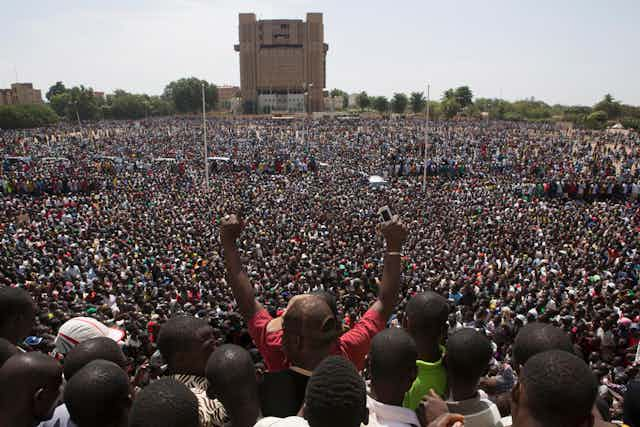Former US president Barack Obama often reminded audiences that his presidency was made possible by the brave men, women, and children of the civil rights movement. They had bolstered America’s democracy through stubborn protest. He applauded mass action as essential to building democracy and ensuring its durability once established.
He did not limit his praise of protest to the American context. In an address in May 2011, he spoke with admiration of the brave protesters of the so-called Arab Spring in the Middle East and North Africa. In his estimation they were akin to America’s 19th-century abolitionists and mid-20th-century civic rights activists.
Obama called these protests powerful democratic expressions from everyday citizens:
There are times in the course of history when the actions of ordinary citizens spark movements for change because they speak to a longing for freedom that has been building up for years.
He spoke glowingly of Tunisian protesters who faced batons and bullets, yet
refused to go home – day after day, week after week – until a dictator of more than two decades finally left power.
Obama embraced protests as an advanced political tool of the marginalised. It is therefore ironic and unfortunate that during his eight years in office he chose not to direct similar praise toward pro-democracy demonstrations in countries south of the Maghreb.
There were many high notes from the Obama administration on African affairs. But his silence on pro-democracy protests in Africa was a missed opportunity to engage directly with mass citizen-led movements.
Protests transforming politics in Africa
During his two official visits to the continent, and when African heads of state visited the White House, Obama raised the issues of transparency and good governance. But he reserved his remarks almost entirely for heads of state. He foisted on them the onus for change.
This is an anaemic rendering of the forces behind good governance in Africa. It stands in marked contrast to the richer, more textured and substantive analyses he offered when it came to the world’s other regions.
Africa has been fertile ground for good governance movements. Transformative activism is redefining political participation in a host of countries. The most notable cases include Zimbabwe, South Africa, Ethiopia and the Democratic Republic of the Congo (DRC).
Protests in Burkina Faso in October 2014 had the greatest success among these disparate movements. They forced Blaise Compaoré to resign when he tried to change the constitution after 27 years in power.
Currently, the DRC is in the midst of a protest-driven political transformation. In Kinshasa, Goma, Lubumbashi and other Congolese cities, more than 170 people have died in more than a year of sporadic protests. Still, people continue to return to the streets.
The breaking point was when President Joseph Kabila refused to step down at the end of his second term, as mandated by the constitution. Protesters have also called for an independent commission to investigate the police violence and killings that have characterised the state’s response to protesters.
Catholic Bishops intervened to mediate talks that included representatives from the government, the political opposition and civil society organisations. These negotiations produced a government commitment to hold elections before the end of 2017.
The agreement also states that Kabila – who has been in power since 2001 – will neither change the constitution nor seek a third term.
The talks and subsequent agreement were a direct product of the mass demonstrations. Mass action is working in the DRC. It would gain strength with greater foreign attention and pressure.
Departing from a proud history of solidarity
Obama, America’s first African-American president, took an approach to Africa that stands in contrast to the 100-plus-year history of African-American political leaders supporting and demonstrating solidarity with good governance movements in Africa.
The most notable, documented and celebrated example was the broad support for the struggle against apartheid in South Africa during the 1970s and 1980s.
But there were other issues and events that inspired Africa- Americans to take action in solidarity with Africans. These included King Leopold of Belgian’s forced labour colony in the Congo, Italy’s invasion of Ethiopia in 1935, white-minority rule in Rhodesia, Portugal’s ongoing colonial occupation in Africa during the early 1970s, and Western complicity in the ousting and ultimate assassination of Congo’s first prime minister, Patrice Lumumba, in 1960.
African-American activists, joined later by lawmakers, remained at the forefront of progressive American support for protest and dissent in the name of democracy and good governance.
Missed opportunities and renewed urgency
No American president had greater goodwill from Africans than Obama. Yet he disappointed by avoiding African issues that the American press and political establishment might consider radical or controversial. To play it safe, Obama stuck to the banal talking points on African authoritarianism and economic liberalism.
Protesters in Africa will not have a better friend in Donald Trump. His presidency is likely to be a reprieve for African autocrats.
Trump will be content to reduce US engagement with Africa to trade and anti-terrorism. He has indicated that humanitarian and development aid are in danger of suffering massive cuts under his administration.
In this nascent, post-Obama period, the ongoing protests in many African cities deserve the support of US lawmakers. Merely acknowledging the issues at the heart of their movements and struggles would legitimise and buoy their causes in the international community. It would also give them leverage in their engagements with their respective governments.
Africa’s pro-democracy movements will continue with or without formal recognition from Trump or members of the US Congress. Yet such recognition is critical to lending them international legitimacy, and would help place extra pressure on repressive regimes targeted by protests.
In the Trump era, civil and human rights organisations, student organisations, trade unions, and African-American and other concerned lawmakers have a particularly important role to play in African affairs.

